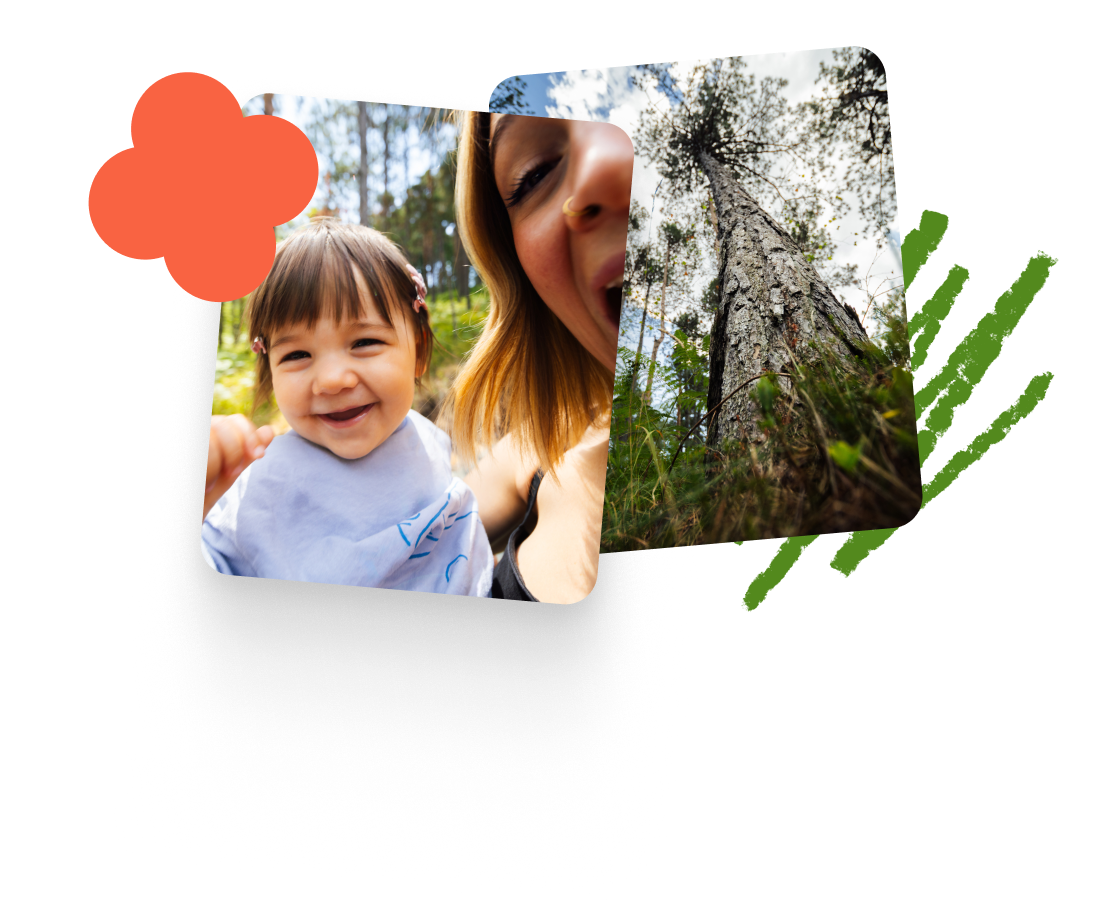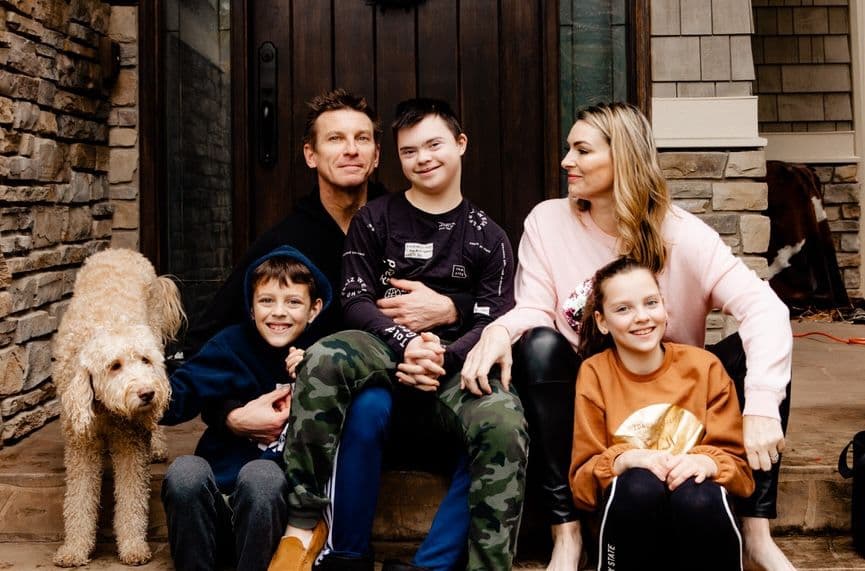
is now part of
Joy Parenting Club!
Families and care organisations using Heba will now have the option to also join Joy. For any questions, reach out to us at hello@heba.care

Families and care organisations using Heba will now have the option to also join Joy. For any questions, reach out to us at hello@heba.care

March 20, 2024
Her firstborn's diagnosis turned her world on its head and saw this mother learning, growing – and downright refusing to accept the status quo for her family.
Sixteen years ago, Sinéad Quinn embarked on a “mystery tour” of parenthood when her son, Torryn, arrived with an unexpected diagnosis of Down syndrome. Since then – and with two more children in tow – the former advertising professional has found her way as an advocate for her son and a healing force for herself and other families in the disability community.
After a long stint of living in the US, Sinéad recently returned home to Australia where she lives in the Southern Highlands, south of Sydney. Alongside her husband, Sasha, she’s navigating the challenges of Torryn’s teendom while carving out a new career path, with the aim of helping fellow parent carers whose lives, as she says, are “bigger and more”.
Here, the podcast host, speaker and wellness expert shares some of her story and advice.

When we are expecting a child, we usually expect to be their parent, not their ‘carer’. Do you identify as a ‘carer’ to Torryn?
I didn’t really identify as a carer in the early years. Because Torryn doesn’t have any significant medical complications, caring for him felt the same as caring for his siblings, although he was developing and growing at a much slower pace.
I remember distinctly when I finally allowed myself to acknowledge and admit that life was bigger and more because we had Torryn. This was really difficult for me to admit and, at the same time, deeply healing. Torryn was around eight years old and in elementary school in the US. We were late to school so often as he would hide his shoes every morning, thinking it was hilarious.
There were obviously many, many other areas of life we were navigating with Torryn – but this was what tipped the scales for me. It was at this time that I gave myself permission to stop attempting to do it all and be perfect. I also started to view my time and capacity differently, and I started to create change.
What were your biggest struggles in the early months and years of parenting Torryn and what helped you during this time?
Other than the constant hospital stays – because he was so unwell so often – one of my biggest struggles was confronting my own bias around disability and forgiving myself for holding it, unconsciously, my whole life. This was big for me, because until I had forgiven myself, how could I have compassion for others who don’t know, or are still learning?
Then the next big challenge I had – and continue to have – are the perceptions and expectations of Torryn’s capabilities from people within the medical and disability communities. I am constantly shocked by the comments, restrictions, language and limits placed on Torryn and on us, as a family, because he is part of our family.
In the early days, I found speaking up for Torryn’s rights to be very emotional – whether it was about the use of language in a social setting or advocating for his rights in a legal or medical setting. What has helped me build confidence is the anger I felt and, also, the deep knowing that I am right. He is my child and he is worthy.
How did you start forming connections with other parents raising kids with disabilities and what changed for you once you started forming these connections?
Initially, finding friends in the disability space was quite difficult. Often we were “paired” with other parents of children with Down syndrome and, honestly, this wasn't enough of a reason to like someone and build a connection.
Eventually I started to make friends with parents of kids that had all different types of disabilities. Becoming a speaker in the US disability space – and the growth of Instagram – really helped. When I started hosting my podcast, Finding Happy, I intentionally found like-minded parents who were enthusiastic for life. I’ve built bonds with some amazing women.

Nowadays, what does caring for Torryn tend to look like?
Well, he’s a teen – so it’s not always smooth sailing! We’ve been navigating some big and very challenging life transitions and Torryn has been struggling with some of these. Recently, his dad was quite unwell and my mum passed away. As a result, Torryn has developed a lot of anxieties, so caring for him involves a lot of reassuring and repetitive questions and answers.
Torryn does not have a level of independence where he can be left unsupervised, so Sasha or myself are always present. We help him with things like personal care, turning on and off the shower and getting dressed. But Torryn wants some level of independence. He understands he is the eldest and he wants to learn to cook and ride bikes like his siblings. Often there are power struggles to be navigated.
The trickiest part about all of this is that Torryn doesn’t want me to teach him how to do things independently. There can be some heightened emotional outbursts at times, however, overall, caring for Torryn is where I’d rather be. It’s sometimes difficult and overwhelming, but it’s also a privilege and an honour to be part of this life with him.
How has your relationship with Sasha changed since you became parents?
Before kids we were footloose and fancy free – we just worked hard and partied harder, it was fun!
The unexpected diagnosis was a real test of our relationship, as well as our second baby being born prematurely at 28 weeks. We came together to weather through the storms, but on reflection, we weren’t communicating with each other. We were just surviving.
There were few books and no podcasts for us 15 years ago, just monthly parent support groups – which were grim, to be honest – so we felt quite isolated in moments. I wanted to work together to heal and, thankfully, my husband agreed. We started with couples’ therapy and worked on speaking up for ourselves. Just as importantly, we worked on properly listening to each other.
These days, as ever, we are a constant work in progress. We still have seasons of couples’ therapy – not just when things are hard, but when things are good. As with anything in life, our relationship requires maintenance to stay strong. It’s not always easy and we most definitely have bumps along the way, but with the commitment to consciously work on our love and union, we are making it work.

How do you two juggle your carer/parent roles between the kids?
Not long after Torryn was born we agreed I would become a stay-at-home mum. It was impossible for me to juggle my advertising career with Torryn heading in and out of hospital so much during his first two years. This was not an easy decision for me, as someone who had always been very career motivated and driven. Financially it was also a blow – and I won’t lie, I love the good life! – so that was a big adjustment, too.
Once the kids started school, I created space to return to my own schooling and retrain myself in an industry I’ve always been extremely passionate about and could make work around parenting. I am now a wellness expert, specialising in somatic breathwork facilitation and meditation – and I love it.
However, I am the primary care provider for Torryn and all his National Disability Insurance Scheme (NDIS), school, medical and therapy needs. Health and wellbeing is my jam and I refuse to accept the status quo for a lot of things for all of my children, but particularly Torryn. I am always looking for new and advanced medicine and therapies. This just isn’t my husband’s mental space and honestly, I’m just a better advocate than he would be.
Torryn, however, is obsessed with his dad, so often Sasha does bedtime routines, showering and the like. Every Friday night, they have pizza and a “sleepover” in Torryn’s room. Torryn counts it down to every week – I’m not invited!
Is there anything you’d like to share about Torryn's relationship with his siblings, too?
Like typical kids, they fight with each other. However, something I am told over and over again is how inclusive and compassionate my younger two kids are. I see it at home, too. They have learnt from their brother to accept differences and to be far less judgemental than I see most other kids being. They also have learnt the power of words and language from a very young age. They are great allies to the disability community and I am very proud of that.

Looking to the future, what are your hopes and dreams around how Torryn is cared for and your role in his care?
I have so many dreams for Torryn to live a semi-independent life with support from not just his family, but also from a strong community. My main dream is for Torryn to feel happy in life and feel like he is living his best life, with friendships and hopefully romantic relationships.
I would love for him to have a job – if he wants one – and be an active and contributing member of society. But also, I want him to live at home forever so I can protect him from the entire world!
What do you wish other people knew about life as a parent carer
Being a parent carer is a lot and some days are harder than others. Don’t pity me and, if you see me struggling, offer to help. Meet me where I am on my life journey. Join me in advocating and learning. Disability isn’t something to fear, or not discuss.
What advice do you have for parents who are new to caring for a child with disability?
My number one advice to everyone in life is get a therapist! Parenting a child with disability is in a completely different stratosphere of life. We have high highs and low lows, and as with any life, there will be hiccups and there will be major events.
Set yourself up for success. The fact your child received a diagnosis already means the path you envisioned for life – either consciously or unconsciously – has now become a magical mystery tour, destination unknown.
You have a choice. You can choose to respond to life or react to life – and there’s a massive difference. You can choose to see, process, heal and grow within the journey you are now navigating or you can choose to become a victim of your child's diagnosis.
And lastly, this isn’t always an easy journey. But there are always miracles along the way, each and every single day. Embrace them. Celebrate them.
Follow Sinéad’s story on Instagram.
Let’s clear out the complexities of care. Try Heba for free.
Want to share your parent-carer story? We’d love to hear it. Get in touch with our team at hello@heba.care